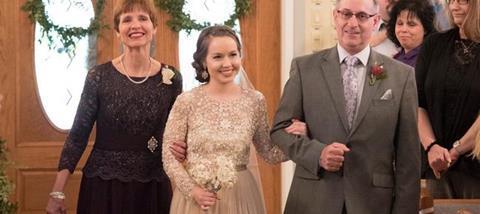
A wedding day is the moment that most girls spend years daydreaming about.
Passing out on your special day isn’t usually part of that vision, but it’s something which was a huge fear for my best friend Rayanne.
I spent months reassuring her that these fears were misplaced, and entirely irrational.
I was wrong.
Speaking to her afterwards, Rayanne explained: “I had never dated that much. I idolised marriage and dreamed about it and wanted it my entire life."
“So when I met my now husband I had so many expectations and obsessions. I had such a fear that I would get it wrong. It caused a lot of anxiety. Any time I would try and move forward or move toward commitment it would trigger anxiety.”
As she walked down the aisle it dawned on me that her biggest fear was about to come true. Sure enough, when it was time for the officiant to hand the bride over to the groom, Rayanne’s body became stiff and she collapsed into the arms of her parents.
“All these thoughts and fears came all at once and the next thing I know I just blacked out,” she said.
Looking for answers
After ten years of friendship and countless hours of listening to her struggles with anxiety and Obsessive Compulsive Disorder (OCD) this was the first time I'd actually seen Rayanne have a panic attack. But after witnessing the profound and disturbing effect Rayanne's anxiety was having on her, I decided it was about time I educated myself on the issues she was facing.
I began by speaking to Will Van Der Hart, who is a director of the Christian mental health charity Mind and Soul Foundation.
“The thing with anxiety is that anxiety itself isn’t bad," he explains. "It’s that people who are struggling with anxiety as an issue have too much anxiety in relation to the experiences that they’re having."
One common diagnosis is General Anxiety Disorder (GAD). It is thought that this condition effects around 5% of the population. One of the most serious consequences is when people experience attacks, similar to what happened to Rayanne on her big day.
“Your body produces a huge amount of hormones that rush round your blood stream, we call that your 'fight or flight response',” Van Der Hart explains. “Those chemicals when released create the accessibility of super human effort for you so you can escape from difficult situations and run faster than you could normally. The trouble is when that mechanism is stimulated without a cause, and there’s no outworking of that, your body responds very negatively.”
Rachel Moreland, a US expat living in Scotland who writes on faith and mental health, can relate: “It almost feels like you're having a stroke or a heart attack.”
A widespread problem
According to the World Health Organisation, the number of people living with anxiety disorders in the world is around 264 million, and it's more prevalent among women.
Christians are clearly not immune from mental health struggles of all sorts, anxiety included. Tributes flooded in on social media last August after news broke that the Pastor of Inland Hills Church in California, Andrew Stoecklein had taken his own life, after a lengthy battle with depression and anxiety. One of Bethel Church's most well known songwriters Brian Johnson has been open about his struggles in this area (see below video). Johnson's new book When God Becomes Real promises to take readers "through the darkest times of his life" and is released next week.
Rayanne's disorder first started to manifest at 14 years-old.
“My anxiety was always God-centered because that was the most important thing to me, so that was what I obsessed about the most,” she said.
Although Rayanne said she's seen the hand of God in helping her through anxiety and OCD it's also been extremely challenging for her faith.
“Every belief I have is so much harder for me than the average person because OCD is the doubting disease. I would be growing so much in my faith but anything would make me doubt,” she said.
Unhelpful responses
Patrick Regan, CEO of the new Christian mental health charity, Kintsugi Hope, said Christians sometimes unknowingly address mental health issues in an unhelpful way.
“Christians have made me feel guilty” he admits. “Somehow the Church has made me feel inadequate, when actually the Christian faith is all about making you feel loved and secure.”
Moreland has had a similar experience: “I’ve heard ‘I think that you’re sinning because you have anxiety’. ‘I think you need to get control of it’. ‘You need to pray about it and it will go away’. It was a very dismissive approach.”
According to Van Der Hart, the idea that anxiety is caused by a lack of trust in God is "one of the worst pieces of mythology" you could ever hear in Church.
Regan, whose latest book is titled Honesty Over Silence: It's OK Not To Be OK, spent years struggling with anxiety and is wary of the thought that the condition can be cured through prayer.
“The danger is that we use prayer as a magic wand. In my experience, for most people who deal with anxiety or a mental health issue, it’s a long-term thing. It’s little steps at a time.”
Van Der Hart says Christians must resist the temptation to over-spiritualise mental health issues: “We should be praying that God will support someone to take the steps to enable their freedom as much as asking God to free them,” he said.
“So much of mental health recovery is about receiving the support from God and others that we need to take to stay well.”
Friendship first
I began this journey believing I needed to study anxiety in order to better support Rayanne. But as I spoke to Van Der Hart, I realised this idea was flawed.
“The important thing in mental health first aid is not becoming the expert,” he explained.
“Imagine your friend having a very complex and rare disease. You would never think for one moment 'I need to go to doctor’s training school to become and expert so I can help them.' Being the best friend you can be is the best offering you can make.
“Friends listen non-judgmentally, they keep on showing up, they are flexible and they help people to evoke courage.”
We may never be experts on mental health problems, but the advice from Van Der Hart is we don't need to be. For many of us, the most helpful thing we can do is be a good friend to those who are experiencing trying times. But what about the bigger picture - how can the Church best serve those who are struggling?
According to Dr Midgely, lots more needs to be done: “When we preach sermons and describe the experience of the Christian life, if we were to acknowledge that struggling with anxiety and worries and fears is part of the normal Christian experience, we make it much easier for people who are battling in that area to talk to one another in church about it and seek help,” he says.
“I think that simple shift will make a huge difference.”
You can hear Tola Mbakwe’s documentary on anxiety at 6:30pm, Saturday 2nd February on Premier Christian Radio
If you've been affected by the issues raised in this article, you can phone Premier Lifeline on 0300 111 0101 or visit mindandsoulfoundation.org






























